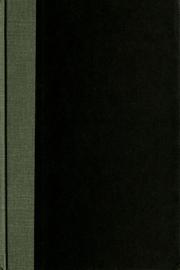| Listing 1 - 2 of 2 |
Sort by
|

ISBN: 0226469123 9786612646379 1282646370 9780226469126 0226468836 9780226468839 0226468844 9780226468846 0226468852 9780226468853 6612646373 9781282646377 Year: 1993 Publisher: Chicago University of Chicago Press
Abstract | Keywords | Export | Availability | Bookmark
 Loading...
Loading...Choose an application
- Reference Manager
- EndNote
- RefWorks (Direct export to RefWorks)
The personal computer has revolutionized communication, and digitized text has introduced a radically new medium of expression. Interactive, volatile, mixing word and image, the electronic word challenges our assumptions about the shape of culture itself. This highly acclaimed collection of Richard Lanham's witty, provocative, and engaging essays surveys the effects of electronic text on the arts and letters. Lanham explores how electronic text fulfills the expressive agenda of twentieth-century visual art and music, revolutionizes the curriculum, democratizes the instruments of art, and poses anew the cultural accountability of humanism itself. Persuading us with uncommon grace and power that the move from book to screen gives cause for optimism, not despair, Lanham proclaims that "electronic expression has come not to destroy the Western arts but to fulfill them." The Electronic Word is also available as a Chicago Expanded Book for your Macintosh®. This hypertext edition allows readers to move freely through the text, marking "pages," annotating passages, searching words and phrases, and immediately accessing annotations, which have been enhanced for this edition. In a special prefatory essay, Lanham introduces the features of this electronic edition and gives a vividly applied critique of this dynamic new edition.
Computers and civilization. --- Civilization and computers --- Civilization --- Computers and civilization --- #A9510A --- Social change --- Mass communications --- Information systems --- Databases. --- Computers and civilization - Databases. --- personal computer, communication, technology, digital, expression, interaction, electronic text, democracy, art, music, humanism, literary study, rhetoric, university curriculum, theory, attention, operating systems, nonfiction, perceptual field, media, higher education, convergence, science, humanities, hypertext, postmodernism, dada, aesthetics, futurism, academic departments, research, instruction, pedagogy.
Book
ISBN: 1283369729 9786613369727 0520951700 9780520951709 9781283369725 9780520270657 0520270657 Year: 2012 Publisher: Berkeley University of California Press
Abstract | Keywords | Export | Availability | Bookmark
 Loading...
Loading...Choose an application
- Reference Manager
- EndNote
- RefWorks (Direct export to RefWorks)
In Searching for Utopia, Hanna Holborn Gray reflects on the nature of the university from the perspective of today's research institutions. In particular, she examines the ideas of former University of California president Clark Kerr as expressed in The Uses of the University, written during the tumultuous 1960s. She contrasts Kerr's vision of the research-driven "multiveristy" with the traditional liberal educational philosophy espoused by Kerr's contemporary, former University of Chicago president Robert Maynard Hutchins. Gray's insightful analysis shows that both Kerr, widely considered a realist, and Hutchins, seen as an oppositional idealist, were utopians. She then surveys the liberal arts tradition and the current state of liberal learning in the undergraduate curriculum within research universities. As Gray reflects on major trends and debates since the 1960s, she illuminates the continuum of utopian thinking about higher education over time, revealing how it applies even in today's climate of challenge.
Education, Higher --- Aims and objectives --- 20th century universities. --- american universities. --- clark kerr. --- college curriculum. --- college education. --- college in america. --- colleges and universities. --- education history. --- education theory. --- educational philosophy. --- higher and continuing education. --- higher ed. --- higher education. --- history of universities. --- liberal arts education. --- research institutions. --- research universities. --- undergraduate curriculum. --- united states history. --- university curriculum. --- university of california. --- university of chicago. --- university presidents.
| Listing 1 - 2 of 2 |
Sort by
|

 Search
Search Feedback
Feedback About UniCat
About UniCat  Help
Help News
News